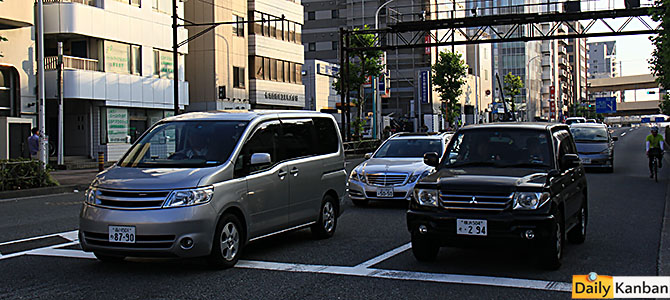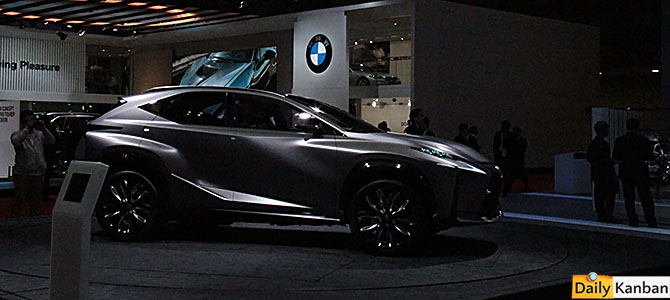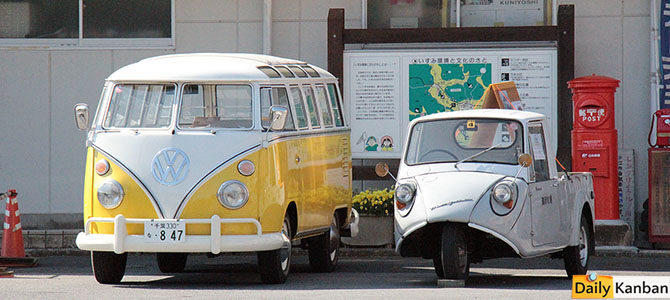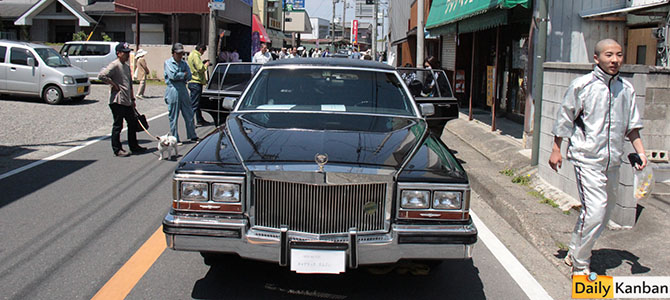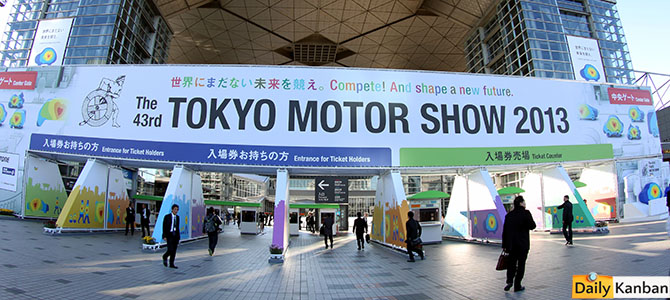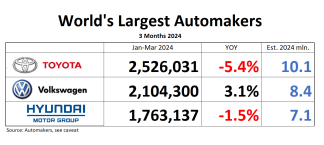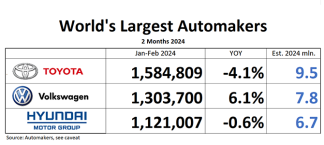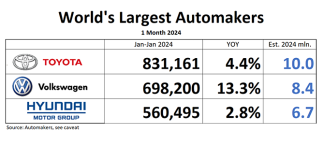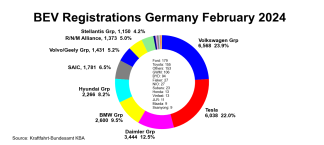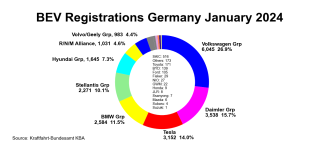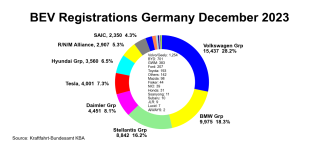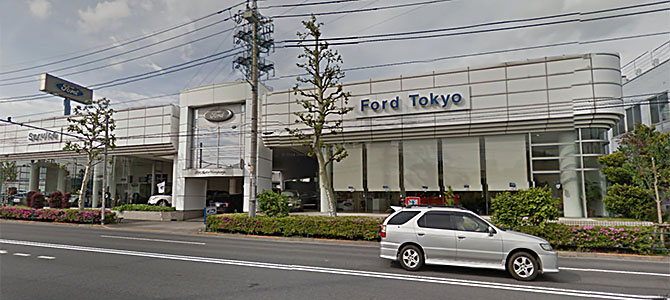
Ford dealer in closed-off Tokyo. You can go there yourself!
I have posted the December and full year 2014 statistics on foreign car imports to Japan, and while doing so, I could not help but observe:
Whenever America gets a new President, someone briefs him on what buttons to push, just in case total thermonuclear war needs to be started. When Ford gets a new leader, he is instructed to accuse Japan of heinous crimes, whenever the opportunity arises, and there’s always a good time to do so. Alan Mulally, when he was the man in charge at Ford, called Japan “the most closed market in the world.” After Mark Fields took over at Ford, he immediately went to Washington, and “urged lawmakers to take a tough line with Japan.” The day-to-day business of demonizing Japan is farmed-out to the American Automotive Policy Council, the lobbying arm of Detroit’s Big Three. It calls Japan’s automobile market “the most protected and closed auto market in the industrial world.” The Japanese car market begs to differ.
Polite as the market is, it differs quietly, hoping against hope that Ford presidents and Detroit lobbyists can do basic math, or read a spreadsheet. 2014 again was a growth year for foreign automakers in Japan. Imports to Japan by foreign OEMs grew 3.4 percent in 2014, outpacing the market for registered vehicles, data by the Japan Automobile Importers Association show. In 2014, the “most closed car market in the world” opened its doors and wallets to 360,000 cars that were not Made in Japan. Excluding mini vehicles, where foreign carmakers do not compete, imported cars hold a share of more than 10 percent of the Japanese market. In December 2014, that share jumped to nearly 16 percent. The only OEMs that saw drastic reductions in imports were Japanese: During the high yen times, they had to turn into importers themselves. With the Japanese currency a bit lower, cars can be made at home again. Full data here.
Japan is one of the easiest markets to get a car in. The customs rate is zero. Once you are in, you are in a tough market. With nearly 600 cars per thousand (the number already has peaked and is declining), with a high urbanization and a dense public transport network, the market is saturated. Land for dealerships can be prohibitively expensive. Nevertheless, eight domestic manufacturers, and more than 60 import brands vie for the buyer’s attention.
Ah, but what about those nasty “non-tariff barriers” Detroit tells us about? Japan has safety and emission rules like (and similar to) other developed countries. However, there is something called a “Preferential Handling Procedure” that allows up to 5,000 cars per type and year to be brought in with the barest of paperwork. Try that in America. America has everything, but no Preferential Handling Procedure.
The ease of bringing a car to Japan creates a rich and diverse market, from the import juggernaut Volkswagen, which brought 104,000 cars into the country in 2014, all the way to Morgan, which imported 21 last year. I know their Tokyo dealer, it’s down the road from me. Due to the extremely liberal low volume regulations, Daimler was able to import exactly one Maybach in 2014. The owner happens to be my father-in-law’s golfing partner. He likes his Maybach. Father-in-law-san wrinkles his nose at his buddy’s choice of car. Too ostentatious for his taste. He likes his new BMW every three years. It’s parked right next to the family shopping cart, a Volkswagen Polo. There also is, equal time, a Honda N-Box, a Toyota Crown, and a Beatles-era Toyota Hilux under a tarp. I married into a family of gaijin-friendly gearheads.
Speaking of family, my brother-in-law, freshly married, bought a Mini Countryman, 4WD. He bought it the Japanese way, he specced it at the Mini dealer, the order was placed, and the car is custom-built in Graz, Austria (so much for a British car.) With shipping, it will be delivered in three months. Japanese and European OEMs have been doing mass customization and built-to-order for decades. At the Ford dealer, it’s the American way, you get what’s on the lot, and the steering wheel can be on the wrong side, if you don’t mind.
If Japan would be as closed as America, Daimler would have had to crash-test at least three Maybachs before the one Maybach would be street-legal to sell to the golfing partner. Japan isn’t like America, so 5,000 Maybachs could be brought in, per year, no crashing required. The strict American rules are a huge barrier for low-volume importers, keeping out many interesting cars. I know for a fact that Volkswagen decided not to federalize the Phaeton MK2, because the huge cost of doing so was not justified by the expected not so huge sales numbers. Even a man as rich as Bill Gates had to spend more than 10 years, along with inordinate amounts of his overabundant money, to be able to legally drive his Porsche 959 around his Medina, Washington neighborhood. If laws had to be rewritten to create a loophole custom-made so that one of the richest men in the world can drive a car he bought a decade ago, the barriers to entry must be formidable.
Private imports of used cars to Japan? No problem. Even such oddballs as 13 Pontiacs, 36 HUMMERs, and two pre-BMW Minis made it to Japan last year, the stats say. In Japan, Bill Gates’ 959 would receive an emphatic “dozo onegaishimasu!”
Did I mention Mini?
Each year, U. S. Customs and Border Protection parades YouTube videos of seized and crushed Minis, pour encourager les autres. The cars are apprehended, because they were passed-off as older Minis, which is very, very illegal. Quite idiotically, a law that claims to be for the protection of the people, allows free importation of decrepit cars 25 years or older, but it bans supposedly better and safer new ones. Try to pass off a new Mini as an old one, and it will be confiscated. In Japan, you can bring all your Minis and Defenders, as long as they are kept to 5,000 a year. Each.
As a matter of fact, Detroit really needs to shut up about “non-tariff barriers.” Detroit brings in most of its cars sold in Japan under the “Preferential Handling Procedure,” fill out a few forms, car is in. Ford sold 4,783 total last year, a good deal of them T-Birds sold to a hooning demographic that doesn’t mind that the steering wheel is on the wrong side.
FCA outsells its Detroit compatriots four to one in Japan. More than half of FCA’s 2014 imports to Japan are Euro models. More Maseratis sold last year in Japan than Chevrolets. Jeep commands an interesting market in the island nation. Let’s see which way FCA will tilt in the future.
The big importers to Japan are all German: Volkswagen, BMW, Daimler. You won’t hear them complain about import restrictions. As a matter of fact, Yasuo Maruta, Communications Director of Volkswagen Japan, told me two years ago: “No, Japan is not a closed market.”
Facts don’t prevent the serial lies by Ford, and the Detroit lobbyists, and the lies go unpunished. Except for occasional mild finger-wagging, there is little pushback from the public. How many ever go to Japan? How many of those buy a car? How many will believe that people famous for their horn-rimmed glasses, and who could sneak an attack on Pearl, could also be able to build both invisible and impenetrable walls against murrican cars? Thought so.
The lies are perpetuated by compliant mouthpieces such as Eamonn Fingleton at Forbes, who wrote recently that Volkswagen has “essentially no presence in Japan.” With more than 100,000 units brought in each year, sold through multiple dealer organizations, and with an import history to Japan that dates back to the early days of the Volkswagen Bug, execs at VW thought that line was uproarious. Fingleton also is convinced that there is no recession in Japan, and that the “lost decades” are a myth. Why? No beggars in the streets. It’s that simple.
For that type of on-the-spot research, we should send Fingleton on a fact—finding mission to a Ford or Chevrolet dealer in Japan. Within minutes, Fingleton would condede that they aren’t really trying to sell anything. Detroit has boycotted any Japanese car show since 2008. No advertising. Panel gaps wide enough to stick your hand through. Did I mention steering wheels on the wrong sides? Americans like Japanese compact cars more than the ones from Detroit, so Japanese do the popular thing in America.
As for bigger cars, don’t fall for the easy answer that the streets are too narrow in Japan. They are narrow, but they are wide enough to make Mercedes the second-bestselling import brand after Volkswagen. In that bracket, a certain amount of class is demanded. Cadillac’s new chief Johan de Nysschen will (perhaps only privately) concede that he won’t be planning for a whole lot more than the 1,000 Cadillacs that were sold to Japanese last year. De Nysschen knows his customers, he ran Audi Japan for years. A good chunk of the 1,000 Cadillacs are Escalades, and sales probably will continue to depend on the spread of organized crime cartels. Some of them are switching to Lexi to keep a low profile, or so I am told.
If Detroit doesn’t really want to sell in Japan, why then the big noise about a supposedly closed market that obviously isn’t? A foreign enemy distracts from the troubles at home. When Detroit points a finger at Japan, three fingers point at Detroit.
Along with China, the U.S. car market actually is one of the most protected, it is surrounded by several rings of defense.
- The 25 years, or older, rule effectively prevents parallel imports. No such thing in Japan. American safety and emissions regulations aren’t necessarily better than those in Europe or Japan, however, they are immensely different. This requires significant amounts of engineering and testing, several magnitudes higher than what it takes to change the often lamented frequencies of key fobs and radios to EU and JP standards. (American carmakers and UAW operatives will and do claim that the cunning rest of the world has completely different rules, aimed at keeping Americans out. That discussion will never end.)
- The lack of low volume clauses makes entry to the American market an all or nothing proposition, there is no way to easily test the waters with a few cars. This is one of the most efficient no-tariff barriers.
- Finally, and most importantly, more than half of the U.S. market is classified as “Light Trucks,” a segment than enjoys explosive growth fuelled by low fuel prices. That segment also happens to come with exorbitant profit margins, due to a wall and moat around America, called the “Chicken Tax.” Half a century ago, the U.S. slapped a 25 percent punitive tariff on imported light trucks, to punish Europeans for discriminating against American chicken. Hence the name. Meanwhile, chicken can be trafficked unimpeded, the Chicken Tax remains. Harvard Professor Robert Z. Lawrence thinks that what is killing Detroit is the very same Chicken Tax: Addicted to easy truck money, Detroit forgets how to compete internationally. The 25 percent surcharge on imported trucks has an effect similar to the war on drugs: It drives up street prices.
A halfway decently appointed Ford F150 pickup, the most blue-collar car carrying the Blue Oval, goes for around $50,000. “Conventional wisdom says German premium brands would dominate the list of top-selling vehicles over $50,000,” said John Krafcik, president of TrueCar. “The reality is that this price segment of the market is dominated by American pickups and SUVs sold through non-premium brand dealers.”
THAT’s what all the empty, but nonetheless effective, rhetoric is about. Detroit, and most of all Ford, is dependent on high doses of expensive trucks. Not being able to shake their heavy Light Truck dependency, Detroit is frightened by the mere possibility that the Chicken Tax might fall, some day. Therefore, Detroit, in a strange, but nonetheless effective, alliance with the UAW, tries to torpedo the Trans Pacific Partnership, or TPP, which could bring the end of the tax, in a galaxy, far away.
By sabotaging the TPP, Detroit does the American citizen a big disservice. Joe Public would love to see a pickup he can afford without going in hock for longer than the truck lasts. He also would be very happy if jobs would stay at home. Mexico has a broad array of trade deals all around the world, and as part of NAFTA, it has become the ideal location for car manufacturing, ignoring the somewhat dicey security situation for a moment. No TPP for America, more jobs for Mexico. The formerly truly closed South Korea dropped real existing trade barriers with Europe, and suddenly, the country spends more on vehicle imports from Europe, than it earns from exports the other way, a good deal, if you are Audi, BMW, or Daimler. Or Toyota: Contravening popular wisdom that Korean hate Japanese, and Japanese hate back, South Koreans are said to flock to the Toyota Corolla.
Ironically, as things stand, Detroit is fighting a war against an enemy who went home bored, quite a while ago. From talking with major Japanese OEMs, I get the lasting impression that the TPP is very low on their agenda. Washington and Tokyo agreed nearly two years ago to “scrap U.S. tariffs on cars gradually over the longest feasible period.” Translation: The Chicken Tax will be here for decades. So will be high tariffs on American rice and foreign butter, along with annual butter shortages in Japan. American rice and dairy farmers would love access to those empty shelves even more than an affordable F150. No dice on both counts.
Shrugged an executive of a large Japanese OEM on Friday night in a Tokyo bar: “TPP, pfffft. We make most of our cars over there already. The import tariff on passenger cars is 2.5 %, it does not really matter. And if the chicken tax ever falls, so what? We’ve been making our trucks over there for years already, and in America, they stand as much a chance against an F150, or a RAM, as a Chevy Cruze against a Corolla in Japan.”
A new year has started, and as far as imports to Japan go, it’s an easy prediction: Car imports to Japan will continue unimpeded, and so will Detroit’s rhetoric that the market is the most closed in the industrial world.
P.S.: A table of foreign car imports to Japan for December and the year 2014 can be found here.
P.P.S.: China announced last week that it will allow parallel imports of cars on a trial basis, thereby legalizing something that has been going on for years. That makes the Chinese market a lot more open than the American. It will be interesting to hear Detroit’s reaction. Will Detroit protest and demand an immediate closure of the Chinese market?
